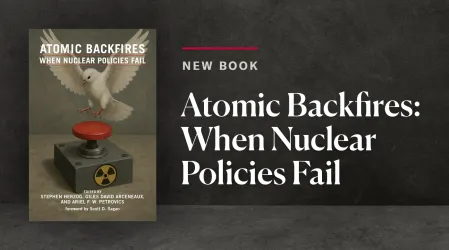World View: Problem: it is the height of the cold war. The United States promises the Soviet Union that it has no intention of launching a surprise attack. The Soviets do not believe it and would have little recourse if America broke its word.
They prepare to launch their missiles on warning. Warnings are notoriously unreliable, so fear of accidental war is high. Assuming that no solution is too extreme, how does the American president demonstrate his good faith?
Solution: arrange for an exchange year whereby every American five-year-old attends kindergarten in Russia. No president, not even Nixon, would risk incurring the wrath of so many parents by pre-emptively attacking the Soviet Union. Absent parental permission, the president could encourage the Soviets to develop an arsenal that would allow them to have enough weapons left over after a surprise attack to retaliate in kind.
Cities rather than five-year-olds would be the hostages now.
This puzzle, and others like it, appear in the pages of several awe-inspiring books by Thomas Schelling, an 84-year-old American, who last Monday won the Nobel Prize for economics, with Robert J Aumann, for his work on game theory in the 1950s and 60s.
Although it was awarded for economics, the Nobel would also have been justly bestowed for peace because Schelling, perhaps more than any other intellectual, was responsible for developing reliable methods to calm the extremely choppy political waters of the cold war.
He did not walk along the path normally trodden by peacemakers — good faith in one's enemy, a leap of faith, unusual risk, and so on — but by mastering the darker arts of the strategy of conflict and violence, what he labelled the underworld. He took the absence of trust as a given and did not assume that others wanted peace, just that they were broadly rational. Game theory — his chosen methodology — studies situations in which the best course of action for one person depends upon what he expects others to do. It applies as much to traffic jams (give taxi drivers a wide berth) and dating (playing hard to get) as it does to international diplomacy.
Schelling's genius was not in the mathematical proof of the theory, but in brilliantly communicating its relevance to real world issues. He rose to prominence with two books, Strategy of Conflict (1960) and Arms and Influence (1969), which have influenced strategists ever since.
The questions that preoccupied him concerned the effectiveness of bargaining, threats, and blackmail in keeping the peace. His work taught us that much of what we knew about these matters was wrong.
He invented many of the counter-intuitive principles of arms control. Famously, he showed that for peace, an ability to defend weapons is more important than an ability to defend people because the power to strike back after being hit first is the key to deterrence.
Therefore, a weapon that can only hurt people is defensive and conducive to peace, whereas a weapon that can destroy an enemy's weapons is offensive and increases the risk of war. Hence, the anti-ballistic missile treaty.
He asked how could you credibly threaten a course of action that may hurt you as well as your adversary?
Uppermost in his mind was nuclear deterrence. Surely it made no sense to respond to the invasion of western Europe by launching a nuclear assault that may destroy everybody.
If such a threat was not credible, the Soviets might just ignore it and start a third World War.
He argued that the key, which applies to all threats of this nature, is to sacrifice control by introducing some element of randomness or craziness. In other words, you need to show that you could not avoid your response even if you wanted to.
To illustrate this point, Schelling recounts the story of a meeting in 1959 between the Soviet premier Nikita Khrushchev and Averell Harriman, an American diplomat.
Khrushchev started by declaring, in very angry tones: "Your generals talk of maintaining your position in Berlin with force. That is a bluff. If you send in tanks . . . our rockets will fly automatically."
At this point, according to Harriman, Khrushchev's colleagues around the table chorused the word "automatically".
Harriman returned to Washington alarmed, warning of the need to be cautious, which was, no doubt, exactly what Khrushchev desired.
Richard Nixon used to call this the mad man theory — sometimes, even if you are perfectly sane, it helps if others think you are capable of absolutely anything.
Schelling's work also demonstrates why in negotiations weakness can be strength. Sometimes you might want to close off certain options, limit your flexibility, and maybe even box yourself into a corner. A general might burn the bridges of retreat behind his own forces. Such a move would encourage his troops to fight harder. It might also give the enemy second thoughts, because any battle would be fought to the last man.
To take an example closer to home, it also suggests that Sinn Fein's negotiating position is improved by the existence of dissident republicans who oppose compromise of any sort. Such hardliners allow Gerry Adams to credibly communicate limits in how far he can go in meeting the demands of his adversaries. In fact, if such dissidents did not exist, it would be in his interest to create them, which of course is precisely what unionists accuse him of doing.
Ironically, it follows that the more successful Adams is in convincing his followers of the wisdom of his approach, the less successful he will be in negotiations.
Schelling moved on to explain the dynamics of tackling global warming, quitting smoking, urban segregation, and many other fascinating issues. However, he has often said that the most important event of the 20th century was the one that did not happen — the cold war turning hot. For his contribution to this non-event, we owe this titan a debt of gratitude.
Tom Wright is a research fellow at Harvard University's Belfer Centre for Science and International Affairs
Wright, Thomas. “Schelling Helped Stop the Cold War Turning Very Hot.” The Irish Times, October 15, 2005





